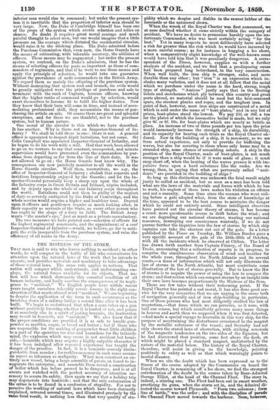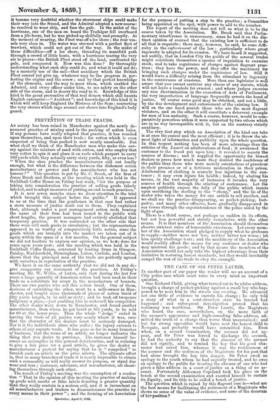THE MISTRESS OF THE STORM.
MAT man is said to win who leaves nothing to accident ; in other words, he will conquer in the battle of life who concentrates his attention upon the natural laws of the work that he intends to execute, and provides materials and machinery to take advantage of those natural laws. The same rule applies to nations. That nation will conquer which understands, and understanding em- ploys, the natural forces available for its objects. That na- tion will lose which disregards this essential condition of all human industry, and lazily, ascribes the consequences of its negli- gence to " accident." We English people have within recent years taught ourselves tolerably severe lessons in the right con- struction of that much-abused word " accident." We are beginning to despise the application of the term to such occurrences as the breaking down of a railway bridge a second time after it has been built. We begin to understand that when a man takes up a gun without positively knowing whether it is loaded or not, and points it at somebody else in a spirit of jesting bravado, the inattention may result in homicide, not " accident." We also know that if the proper conditions are provided it is as safe to handle gun- powder as marbles, sugar, or bread and butter ; but if those who are responsible for the making of gunpowder trust little children to a part of the operation too nice and hazardous for the infantile mind, the explosion which may ensue is not accident but homi- cide,—homicide which may acquire a highly culpable character if it has been indulged' after repeated experience has taught the danger of the practice. In fact, it is a homicide scarcely distin- guishable from murder ; for recklessness may in such cases assume an aspect as inhuman as malignity. When men construct an en- tirely new vessel, bring a large assembly of guests on board to in- augurate the enterprise, and assemble them round a construction of boiler which has before proved to be dangerous, and is at all events not watched with the perfect accuracy of attention ne- cessary to secure its safety, then again we say that a holiday trip may degenerate into homicide; and that the only extenuation of the crime is to be found in a confession of stupidity. For not to perceive the working of natural laws which have been distinctly 'explained, retraced several times, and illustrated precisely by the game fatal result, is nothing less than that very quality of stu-
pidity which we despise and dislike in the rawest lubber of the forecastle or the untutored clown.
When the wreck of the Royal Charter was first announced, we at once doubted whether it came strictly within the category of accident. We have no desire to pronounce harshly upon the un- fortunate Commander, who was most certainly acting " for the best." Yet in many respects he must deliberately have selected a risk far greater than the risk which he would have incurred by a more careful course; as for instance in hugging a lee shore, when a comparatively slight knowledge of the well-known coast would have told him that it was peculiarly dangerous. A corre- spondent of the Times, however, supplies us with a further analysis of the accident, and we find that a predisposing cause had been prepared long beforehand, in the very construction. When well built, the iron ship is stronger, safer, and more durable than any other ; but "iron " is an expression which in- cludes many varieties, and it does not at all follow that the metal which we purchase under the name is the hard, strong, tough type of strength. " Amicus " justly says that in the floating hotels and storehouses which ply between this country and great ports abroad, no material should be used but the best-seasoned spars, the stoutest planks and ropes, and the toughest iron. In point of fact, however, most iron ships are constructed of a metal which is sold under the name of " boat-plates," and in any list of prices, boat-plates stand the lowest. We pay 251. or 301. a ton for the plates of which the locomotive boiler is made, but we only give 9/. or 8/. 10s. for boat-plates which are nearly as brittle as glass. An increase of two or three pounds per ton upon the price would immensely increase the strength of a ship, its durability, and its capacity for bearing such trials as the Royal Charter en- dured. Now in the building of a ship, it is necessary, as we see from actual experience, not only to provide for buffeting the waves, but also for securing to those whose only home may be a stranded ship, some chance of scrambling ashore. A ship in the position of the Royal Charter, made of boat-plates, is not much stronger than a ship would be if it were made of glass; it must snap short off, when the beating of the waves presses it with im- pulsive force upon a hard substance like the rocks. Are we wrong, then, in saying that what are perversely called " acci- dents" are provided in the building of ships ?
So long as this distinction was unknown the fatal result might justly be called an accident, but as soon as a man has been told what are the laws of the materials and forces with which he has to work, his neglect of those laws makes his violation an offence and not a casualty. Some time since the seaman who went sail- ing before a gale adopted what, from the state of knowledge at the time, appeared to be the best course to minimize the danger which he could not entirely avoid. Since intelligent observers have pointed out the circular theory of storms, it has become a much more questionable course to drift before the wind ; and we are degrading our national character, wasting our national resources, destroying our countrymen wantonly, if we do not pursue further the inquiries into the law of storms by which ship captains can take the shortest cut out of the gale. In a letter published by the Times on Tuesday, Mr. William Burder gave a very specific account of the gale of the 25th-26th of October, with all the incidents which he observed at Clifton. The letter has drawn forth another from Captain Fitzroy, of the Board of Trade, announcing that a collection of reports is in progress, to comprise the simultaneous observation of wind and weather for the whole year, throughout the North Atlantic and its several coasts,—a mass of information which will not only illustrate the law of storms in the North Atlantic, but must contribute some illustration of the law of storms generally. But to know the ltlw of storms is to acquire the power of using the law to conquer the storm; and that nation which can conquer storms by an insight into their own laws becomes proportionately the Mistress of the Seas. There are few tales without their redeeming point. If the Royal Charter has pointed a sad moral, it has also done good ser- vice for the very researches that we are urging in the cause both of navigation generally and of iron ship-building in particular. One of those persons who had most diligently studied the law of magnetism,---that force which we can perceive, as it were, with half our senses, but which manifestly governs many more things in heaven and earth than we supposed when it was first detected, —had made a special voyage to Australia in this very ship, for the purpose of ascertaining the disturbance occasioned to the magnet by the metallic substance of the vessel; and Scoresby had not only shown the stated laws of aberration, with striking reversals of the magnetic tendencies on the two sides of the Equator, but he had discovered that position, some feet above the deck, on which might be placed a standard magnet, undisturbed by the nature of the material below. The history of the Royal Charter, therefore, will assist in giving us the knowledge, pointing positively to safety as well as that which warningly points to mortal disaster.
When we cite the doubt which has been expressed as to the fitness of the course adopted by the Commander on board the Royal Charter. in remaining off a lee shore, we find the strongest corroboration of the doubt in the course taken by Rear-Admiral George Elliot, at the head of the Channel Fleet. The story is, indeed, a stirring one. The Fleet had been out in smart weather, practising its guns, when the storm set in, and the Admiral di- rected the course toward Plymouth. " Form two columns ; form line of battle," was the order ; and with the discipline of parade the Channel Fleet moved towards the harbour. Soon, however, it became very doubtful whether the sternmost ships could make their way into the Sound, and the Admiral adopted a new course: he resolved to wear ship, and face the gale. In the midst of the hurricane, one of the men on board the Trafalgar fell overboard from a jib-boom, but he was picked up skilfully and promptly. At the moment of wearing, the Fleet was off a lee shore; the rear ves- sels very close in. The water was strewed with a perfect fleet of trawlers, which could not get out of the way. In the midst of these difficulties—off a lee shore, threading its manifold path through a crowd of little boats, with a hurricane tearing the very air to pieces—the British Fleet stood off the land, confronted the gale, and conquered it. How was this done ? By thoroughly understanding what each ship could do, and what it could not do ; by a masterly use of the sail—that auxiliary which the British Fleet cannot yet give up, whatever may be the progress in per- fecting the engine and the screw ; and by that perfect knowledge of the elements, and the way to meet them, which enabled the Admiral, and every officer under him, to see safety on the other side of the storm, and to descry the road to it. Knowledge of this kind is the great preventive of that real demon which still haunts English enterprise—" Accident "; and knowledge of this kind it is which will still keep England the Mistress of the Seas ; converting the very storms which rage around our shores into England's body guard.



























 Previous page
Previous page